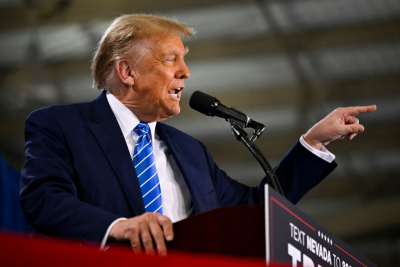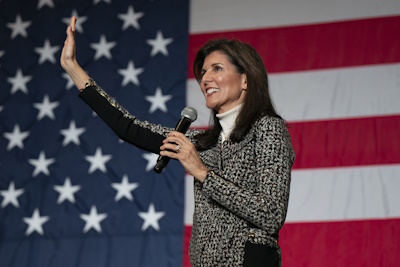Para leer en español, vea esta traducción de Google Translate.
Former President Donald Trump and Nikki Haley, the former U.S. ambassador to the United Nations, have misfired in launching attacks on each other recently:
- Trump said Haley “supports a 23% national sales tax.” A dozen years ago, Haley posted a Facebook message in support of replacing the income tax with a sales tax — a concept known as the Fair Tax. But Haley has not campaigned for the Fair Tax in the presidential election.
- Haley falsely claimed that Trump “proposed a 25-cent-per-gallon increase” in the federal gasoline tax when he was president. Trump considered raising the gasoline tax to fund his $1.5 trillion infrastructure plan, but never proposed such a tax hike.
- Trump wrongly claimed Haley wants to raise the Social Security retirement age by 10 to 12 years, even for people currently “in their 60s or 70s.” Haley has advocated raising the retirement age, but only for people now in their 20s.
Haley is the last remaining opponent standing in the way of Trump securing the GOP presidential nomination. The next contested GOP primary is in South Carolina on Feb. 24.
Haley and the Fair Tax
At a rally in Las Vegas on Jan. 27, Trump said Haley “supports a 23% national sales tax.” A dozen years ago, when she was serving as South Carolina governor, Haley posted a Facebook message that said, “Yes, I support the Fair Tax and any reform that would eliminate income tax.”
At the time, the South Carolina Legislature was circulating a Fair Tax plan to replace the state income tax with a sales tax. But plans introduced both before and after Haley’s post never went anywhere, dying in state committees.

It’s unclear if Haley’s comment in 2012 was in support of a state or national so-called Fair Tax, and the Haley campaign did not clarify that point for us.
As we have written, Republicans in the U.S. Congress have introduced versions of the Fair Tax in successive Congresses since 1999. The latest attempt, H.R. 25, was introduced by GOP Rep. Earl “Buddy” Carter of Georgia on Jan. 9, 2023.
“This bill imposes a national sales tax on the use or consumption in the United States of taxable property or services in lieu of the current income taxes, payroll taxes, and estate and gift taxes,” according to a Congressional Research Service summary of the legislation.
The tax would start at 23% in 2025, and it would be adjusted in future years. That’s the tax-inclusive rate, meaning that prices for goods under the tax system would include the national sales tax.
But Haley hasn’t proposed anything nearly that radical in her 2024 presidential campaign. Haley gave a rough outline of her tax plans in a speech, titled “America’s Secret Weapon,” which she gave at St. Anselm College in September.
In a review of that plan, Howard Gleckman, a senior fellow at the Urban-Brookings Tax Policy Center, wrote that Haley “backs big tax cuts for individuals and small businesses but opposes what she calls ‘corporate welfare.'”
Gleckman noted that her proposals included: eliminating the federal gasoline tax; reducing individual income tax rates, as well as tax brackets for what Haley called “working families”; eliminating the ability to deduct state and local taxes from income tax returns; and making permanent a tax deduction for pass-through businesses that was part of the 2017 Tax Cuts and Jobs Act.
According to Gleckman, key elements of her presidential campaign agenda “are inconsistent with her record as South Carolina’s governor.” But, Gleckman told us via email, “I have not heard Haley talk about the Fair Tax during her presidential campaign. As my column noted, her campaign tax proposals so far have been fairly modest, certainly nothing like replacing the income tax as the Fair Tax would.”
Trump and the Gasoline Tax
In her Jan. 28 speech in South Carolina, Haley falsely claimed that Trump proposed to raise the federal gasoline tax when he was president.
Haley spoke at Coastal Carolina University in Conway, where she challenged Trump to a debate. The former president so far has not participated in any of the Republican primary debates.
Haley, Jan. 28: Don’t you think it’s time that he said why he proposed a 25-cent-per-gallon increase in gas on all of us when he was president?
Trump considered but never formally proposed a gasoline tax hike while president.

In the spring of 2017, Bloomberg reported that Trump said in an interview that he was considering a gasoline tax hike as a possible funding source for his proposed infrastructure plan. “The truckers have said that they want me to do something as long as that money is earmarked to highways,” Trump told Bloomberg.
After Bloomberg’s story, White House Press Secretary Sean Spicer told reporters that Trump met with business leaders, who suggested a gasoline tax hike. “He did not express support for it,” Spicer said of Trump. “He expressed that a group that had met with him expressed support with it, and that he, out of respect, would consider their request.”
The issue came up again in early January 2018, when the Washington Post wrote that Trump “mused” about raising the gasoline tax to 50 cents per gallon. The paper cited an anonymous source who attended a meeting between Trump and Republican Rep. Bill Shuster of Pennsylvania, chairman of the House transportation committee. The White House and Shuster declined to comment.
In his State of the Union address on Jan. 30, 2018, Trump called on Congress “to produce a bill that generates at least $1.5 trillion for the new infrastructure investment we need.” Less than two weeks later, Trump released a $1.5 trillion infrastructure plan on Feb. 12, 2018, that called for $200 billion in new federal aid with the rest of the funds coming from “partners at the State, local, Tribal, and private level.”
But Trump did not suggest a tax hike to fund the plan, as Vox reported at the time.
“Trump isn’t proposing to increase that tax to generate the $200 billion fund he’s calling for, nor is he proposing to increase any other tax to do it,” Vox wrote in a Feb. 12, 2018, article. “He’s just saying the $200 billion should be offset by unspecified spending cuts elsewhere.”
The next day, Elaine Chao, Trump’s transportation secretary at the time, was asked by a reporter at a White House briefing what she thought of gasoline tax hikes proposed by the U.S. Chamber of Commerce and a trucking industry association to support infrastructure improvements. Chao said a tax hike “is not ideal,” but the president “has not declared anything out of bounds, so everything is on the table.”
On Feb. 14, 2018, Democrats said Trump endorsed a 25-cent-per-gallon hike in the federal gasoline tax at a closed-door meeting. According to Politico, Sen. Tom Carper of Delaware confirmed after the meeting that Trump “offered his support for raising the gas and diesel tax by 25 cents a gallon and dedicating that money to improve our roads, highways, and bridges.”
But that same article said the White House did not confirm that Trump had endorsed a gasoline tax hike.
Later that month, Steven Mnuchin, Trump’s treasury secretary, said “we’re looking at” a gasoline tax hike, but that “the president is focused on the idea of Internet sales tax.” Mnuchin said no decisions had been made.
And, as it turned out, no decision was ever made to raise the gasoline tax.
Trump never officially proposed a hike in the gasoline tax, which has not been raised since 1993 and remains at 18.40 cents per gallon for gasoline and 24.40 cents for diesel fuel.
In February 2020, upon releasing the president’s fiscal year 2021 budget — which turned out to be Trump’s final budget — then-Acting Office of Management and Budget Director Russ Vought was asked why Trump wasn’t interested in raising the federal gasoline tax. “The president doesn’t want to do anything right now that could have any impact on economic growth,” he said. “There’s no tax increases in this budget, and we are proposing to have offsets on the spending side.”
Haley would be correct to say that Trump considered raising the gasoline tax while president, but she’s wrong to say he proposed it.
Haley on Social Security Retirement Age
In his speech, Trump also claimed Haley “wants to gut Medicare and Social Security, raising the retirement age of Social Security too. Think of this, about 77, about 10 years, 12 years. Anybody in their 60s or 70s, would you like to say, ‘I’m just about there darling?’ You’re 62 years old. ‘I’m just about there darling, but I see Nikki Haley wants to make it 10 years longer.’”
That’s a distortion of Haley’s position.
Haley has said she supports raising the age of eligibility for Social Security benefits to address concerns about the program’s solvency — but only for people who are currently in their 20s.
As we have written, Haley announced her stance back in March, although she did not specify what the increased age would be.
“We’re not taking it from seniors,” Haley said at the March rally announcing her position. “We’re not taking it to anyone who’s been promised anything. My parents are in their 80s. I don’t want anybody touching theirs.”
Haley’s plan for Social Security includes limiting the growth of benefits for high-income seniors and basing cost-of-living adjustments on the chained CPI (a method that, as we have explained, some economists say would more accurately measure the cost of living but would lower increases compared with the traditional measure). Haley also said she would raise the retirement age for younger adults and index Social Security benefits to life expectancy.
“What you would do is, for those in their 20s coming into the system, we would change the retirement age so that it matches life expectancy,” she told Fox News at the time.
Haley confirmed in a debate on Jan. 10 that in her view, people in their 20s “should plan on their retirement age being increased” to better match life expectancy, but again she declined to specify an age.
We should note that Trump once held a similar position.
In his 2000 book “The America We Deserve,” Trump proposed raising the Social Security retirement age to 70.
“A firm limit at age seventy makes sense for people now under forty,” Trump wrote. “We’re living longer. We’re working longer. New medicines are extending healthy human life. Besides, how many times will you really want to take that trailer to the Grand Canyon? The way the workweek is going, it will probably be down to about twenty-five hours by then anyway. This is a sacrifice I think we all can make.”
Trump has since reversed course, holding the line on the Social Security retirement age as president and saying in a video posted to Truth Social on Jan. 20, 2023, “Under no circumstances should Republicans vote to cut a single penny from Medicare or Social Security.” But he has not said how he will address shortfalls caused by the looming depletion of the Social Security trust funds.
The age of full retirement for future Social Security benefits is currently 67 for people born in 1960 or later. The youngest age at which someone can start collecting Social Security benefits is 62 — at a reduced amount.
Editor’s note: FactCheck.org does not accept advertising. We rely on grants and individual donations from people like you. Please consider a donation. Credit card donations may be made through our “Donate” page. If you prefer to give by check, send to: FactCheck.org, Annenberg Public Policy Center, P.O. Box 58100, Philadelphia, PA 19102.